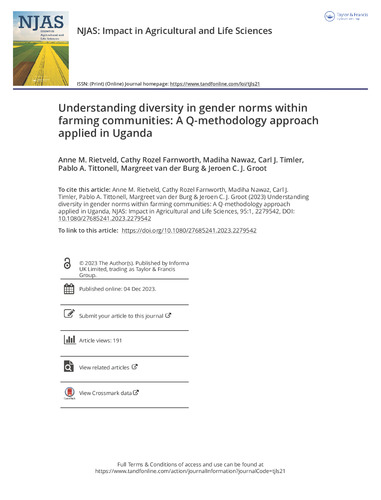Understanding diversity in gender norms within farming communities: A Q-methodology approach applied in Uganda
Abstract
Women’s and men’s opportunities are influenced by gender norms which shape their respective behaviours, roles and decision-making power. Gender norms thus influence farming outcomes and the ability of women and men to secure their livelihood objectives. We study gender norms and normative change in a smallholder farming community in Uganda. We argue that gender norms operate in sets and that multiple sets of gender norms may co-exist in the same location. To empirically demonstrate this, we employ mixed methods centred around the use of Q-methodology and further consisting of a survey, focus group discussions and individual interviews. In our study, 80 participants (50% men) ranked 40 statements pertaining to gender norms. Factor analysis yielded three different groups each representing a distinct “set” of gender norms representing varying appreciations for women’s agency amongst other things. Survey data analysis found that participants’ “gender” and “wealth status” were associated with these sets. We explored gender normative change through our qualitative tools and build an analytical framework in which we plot the three groups to help visualize and comprehend gender normative change processes. We conclude that the three groups can be understood as being part of messy normative change processes. Dynamic interplay between these groups is likely to act as a mechanism for change. Our findings and unique methodological approach provide useful entry-points for identifying sets of gender norms in particular locations. This opens the door to delivering gender transformative research, interventions and policies tailored to the diverse needs of women and men.

